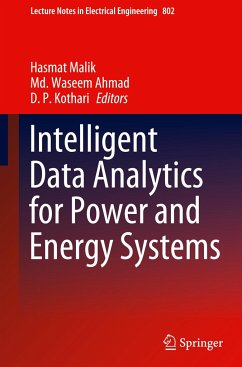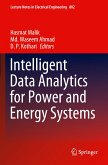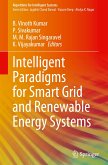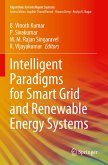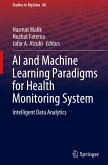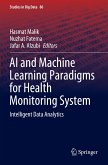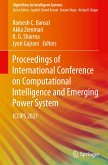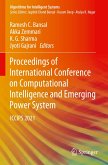Intelligent Data Analytics for Power and Energy Systems
Herausgegeben:Malik, Hasmat; Ahmad, Md. Waseem; Kothari, D.P.
Intelligent Data Analytics for Power and Energy Systems
Herausgegeben:Malik, Hasmat; Ahmad, Md. Waseem; Kothari, D.P.
- Gebundenes Buch
- Merkliste
- Auf die Merkliste
- Bewerten Bewerten
- Teilen
- Produkt teilen
- Produkterinnerung
- Produkterinnerung
This book brings together state-of-the-art advances in intelligent data analytics as driver of the future evolution of PaE systems. In the modern power and energy (PaE) domain, the increasing penetration of renewable energy sources (RES) and the consequent empowerment of consumers as a central and active solution to deal with the generation and development variability are driving the PaE system towards a historic paradigm shift. The small-scale, diversity, and especially the number of new players involved in the PaE system potentiate a significant growth of generated data. Moreover, advances…mehr
Andere Kunden interessierten sich auch für
![Intelligent Data Analytics for Power and Energy Systems Intelligent Data Analytics for Power and Energy Systems]() Intelligent Data Analytics for Power and Energy Systems131,99 €
Intelligent Data Analytics for Power and Energy Systems131,99 €![Intelligent Paradigms for Smart Grid and Renewable Energy Systems Intelligent Paradigms for Smart Grid and Renewable Energy Systems]() Intelligent Paradigms for Smart Grid and Renewable Energy Systems139,99 €
Intelligent Paradigms for Smart Grid and Renewable Energy Systems139,99 €![Intelligent Paradigms for Smart Grid and Renewable Energy Systems Intelligent Paradigms for Smart Grid and Renewable Energy Systems]() Intelligent Paradigms for Smart Grid and Renewable Energy Systems139,99 €
Intelligent Paradigms for Smart Grid and Renewable Energy Systems139,99 €![AI and Machine Learning Paradigms for Health Monitoring System AI and Machine Learning Paradigms for Health Monitoring System]() AI and Machine Learning Paradigms for Health Monitoring System139,99 €
AI and Machine Learning Paradigms for Health Monitoring System139,99 €![AI and Machine Learning Paradigms for Health Monitoring System AI and Machine Learning Paradigms for Health Monitoring System]() AI and Machine Learning Paradigms for Health Monitoring System139,99 €
AI and Machine Learning Paradigms for Health Monitoring System139,99 €![Proceedings of International Conference on Computational Intelligence and Emerging Power System Proceedings of International Conference on Computational Intelligence and Emerging Power System]() Proceedings of International Conference on Computational Intelligence and Emerging Power System177,99 €
Proceedings of International Conference on Computational Intelligence and Emerging Power System177,99 €![Proceedings of International Conference on Computational Intelligence and Emerging Power System Proceedings of International Conference on Computational Intelligence and Emerging Power System]() Proceedings of International Conference on Computational Intelligence and Emerging Power System177,99 €
Proceedings of International Conference on Computational Intelligence and Emerging Power System177,99 €-
-
-
This book brings together state-of-the-art advances in intelligent data analytics as driver of the future evolution of PaE systems. In the modern power and energy (PaE) domain, the increasing penetration of renewable energy sources (RES) and the consequent empowerment of consumers as a central and active solution to deal with the generation and development variability are driving the PaE system towards a historic paradigm shift. The small-scale, diversity, and especially the number of new players involved in the PaE system potentiate a significant growth of generated data. Moreover, advances in communication (between IoT devices and M2M: machine to machine, man to machine, etc.) and digitalization hugely increased the volume of data that results from PaE components, installations, and systems operation. This data is becoming more and more important for PaE systems operation, maintenance, planning, and scheduling with relevant impact on all involved entities, from producers, consumer,s and aggregators to market and system operators. However, although the PaE community is fully aware of the intrinsic value of those data, the methods to deal with it still necessitate substantial enhancements, development and research. Intelligent data analytics is thereby playing a fundamental role in this domain, by enabling stakeholders to expand their decision-making method and achieve the awareness on the PaE environment. The editors also included demonstrated codes for presented problems for better understanding for beginners.
Produktdetails
- Produktdetails
- Lecture Notes in Electrical Engineering 802
- Verlag: Springer / Springer Nature Singapore / Springer, Berlin
- Artikelnr. des Verlages: 978-981-16-6080-1
- 1st edition 2022
- Seitenzahl: 664
- Erscheinungstermin: 18. Februar 2022
- Englisch
- Abmessung: 241mm x 160mm x 41mm
- Gewicht: 1150g
- ISBN-13: 9789811660801
- ISBN-10: 9811660808
- Artikelnr.: 62386139
- Herstellerkennzeichnung Die Herstellerinformationen sind derzeit nicht verfügbar.
- Lecture Notes in Electrical Engineering 802
- Verlag: Springer / Springer Nature Singapore / Springer, Berlin
- Artikelnr. des Verlages: 978-981-16-6080-1
- 1st edition 2022
- Seitenzahl: 664
- Erscheinungstermin: 18. Februar 2022
- Englisch
- Abmessung: 241mm x 160mm x 41mm
- Gewicht: 1150g
- ISBN-13: 9789811660801
- ISBN-10: 9811660808
- Artikelnr.: 62386139
- Herstellerkennzeichnung Die Herstellerinformationen sind derzeit nicht verfügbar.
Dr. Hasmat Malik (Senior Member IEEE) received M.Tech degree in electrical engineering from the National Institute of Technology (NIT) Hamirpur, Himachal Pradesh, India, and the Ph.D. degree in Electrical Engineering from Indian Institute of Technology (IIT), Delhi. He has served as an assistant professor for more than five years at the Division of Instrumentation and Control Engineering, Netaji Subhas Institute of Technology (NSIT), Dwarka, Delhi, India. He is currently a chartered engineer (CEng) and a professional engineer (PEng). He is also a research fellow with Berkeley Education Alliance for Research in Singapore (BEARS), a research centre of the University of California, Berkeley, University Town, National University of Singapore (NUS), Singapore, since January, 2019. He has published widely in international journals and conferences his research findings related to intelligent data analytics, artificial intelligence, and machine learning applications in power system,power apparatus, smart building and automation, smart grid, forecasting, prediction and renewable energy sources. Dr. Hasmat has authored/co-authored more than 100 research papers and eight books and thirteen chapters in nine other books, published by IEEE, Springer, and Elsevier. He has supervised 23 PG students. His principal area of research interests is artificial intelligence, machine learning and big data analytics for renewable energy, smart building and automation, condition monitoring and online fault detection and diagnosis (FDD). Dr. Malik is also a member of the Computer Science Teachers Association (CSTA), the Association for Computing Machinery (ACM) EIG, the Institution of Engineering and Technology (IET), UK, and Mir Labs, Asia, a life member of the Indian Society for Technical Education (ISTE), the Institution of Engineers (IEI), India, and the International Society for Research and Development (ISRD), London, and a fellow of the Institution of Electronics and Telecommunication Engineering (IETE). He received the POSOCO Power System Award (PPSA-2017) for his Ph.D. work for research and innovation in the area of power systems. He also received the Best Research Papers Awards from IEEE INDICON-2015 and the Full Registration Fee Award from IEEE SSD-2012, Germany. Dr. Md. Waseem Ahmad (Member, IEEE) received the B.Tech. and M.Tech. degrees in electrical engineering from Aligarh Muslim University, Aligarh, India, in 2008 and 2011, respectively, and the Ph.D. degree in electrical engineering from the Indian Institute of Technology Kanpur, Kanpur, India, in 2018. He worked as a research fellow with the Department of Electrical and Computer Engineering, National University of Singapore, Singapore, and a graduate trainee engineer with Siemens Ltd., India. He is currently an assistant professor with the National Institute of Technology Karnataka, Surathkal, India. His research interests include fault diagnostics and condition monitoring of power electronic converters. Prof. (Dr.) D. P. Kothari obtained his BE (Electrical) in 1967, ME (Power Systems) in 1969, and Ph.D. in 1975 from BITS, Pilani, Rajasthan. From 1969 to 1977, he was involved in teaching and development of several courses at BITS Pilani. Earlier Dr. Kothari served as vice chancellor, VIT, Vellore, director in-charge and deputy director (Administration) as well as head in the Centre of Energy Studies at Indian Institute of Technology, Delhi, and as a principal, VRCE, Nagpur. He was a visiting professor at the Royal Melbourne Institute of Technology, Melbourne, Australia, during 1982-83 and 1989, for two years. He was also NSF Fellow at Perdue University, USA ,in 1992. He also taught at Melbourne University Australia for one semester in 1989. Dr. Kothari, who is a recipient of the most Active Researcher Award, has published and presented 830 research papers in various national as well as international journals,conferences, guided 56 Ph.D scholars and 68 M. Tech students, and authored 67 books in various allied areas. He has delivered several keynote addresses, 100 plus Webinars and invited lectures at both national and international conferences. He has also delivered 42 video lectures on YouTube with maximum of 60,000 hits! Dr. Kothari is a fellow of the National Academy of Engineering (FNAE), fellow of Indian National Academy of Science (FNASc), fellow of Institution of Engineers (FIE), fellow IEEE, honourable fellow ISTE, and fellow IETE. Having received 76 awards till now, his many awards include the National Khosla Award for Lifetime Achievements in Engineering (2005) from IIT, Roorkee. The University Grants Commission (UGC), Government of India, has bestowed the UGC National Swami Pranavandana Saraswati Award (2005) in the field of education for his outstanding scholarly contributions. He is also the recipient of the Lifetime Achievement Award (2009) conferred by the World Management Congress, New Delhi, for his contribution to the areas of educational planning and administration. Recently, he received Excellent Academic Award at IIT Guwahati by NPSC-2014. He has received 6 Life Time Achievement awards by various agencies on 19th February, 4th March, 11th March, 18th March, 20TH March, and 25th March 2016, respectively. On 20th April 2016, he received 'Living Legend' Award in Chennai Conference. Recently, he received Malviya Award for Excellence in Power System at IIT Gandhinagar on 17th Dec 2020. Dr Kothari is also distinguished Emeritus professor and adjunct professor at several institutes such as Charutar university, Gujrat, and Wainganga college of engineering, Nagpur. Currently, Dr. Kothari is with S.B Jain Institute of Management , Research, and Technology, Nagpur, serving as a director research and professor. He is also a chairman board of governors of THDC Institute of Hydropower Engineering and Technology, Tehri, and a visiting professor at Wainganga college of engineering, Nagpur.
Intelligent Approach for Analysis and Diagnosis of Attack, Fault and Load Variation in SCADA Systems: A Power System Application.- Intelligent Approach for Distributed Generation Planning and Distribution Network Reconfiguration Using Metaheuristic Technique.- Intelligent Modelling and Analysis of Direct Torque Control-Space Vector Modulation of Doubly Fed Induction Generator (DFIG).- Modelling and Analysis of an Intelligent Approach for Load Frequency Control in a Deregulated Power System: A Case Study Based on Different Control Schemes.- Mathematical Approach Based Power System Analysis: A Review of Short Term Hydro Scheduling.- Novel Approach for Power System Stability Analysis and Improvement: A Case Study Based on UPFC Application.- Intelligent Modelling and Analysis of P-Q Control Technique for SPV Plant Supplying Power to Grid.- Intelligent Approach for Fuel Constrained Economic Emission Dispatch Analysis Using Multi-objective Differential Evolution.- Intelligent Adaptive CriticScheme Implementation and Investigation Using Policy Iteration Technique: A case study of Multi-Area Automatic Generation Control (AGC) Problem.- Intelligent Method for Installation and Investigation of VSC-HVDC Converter Using Metaheuristic Algorithm: A Case Study of Unified Optimal Power Flow problem.- Implementation and Analysis of TID Controller for Power Apparatus Applications using Flower Pollination Algorithm.- Intelligent Technique for Eccentricity Fault Diagnosis of Power Apparatus Using Signal Processing Method.- Intelligent Methods for Power System Analysis: Advancement in Optimization and its Application.- Investigation and Analysis of Harmonics in Different Control Techniques of PMSM Drives: An Application of Power System Health Monitoring.- Design and Analysis of Artificial Intelligence Method for MPPT Control: An Application of Grid Connected PV System.
Intelligent Approach for Analysis and Diagnosis of Attack, Fault and Load Variation in SCADA Systems: A Power System Application.- Intelligent Approach for Distributed Generation Planning and Distribution Network Reconfiguration Using Metaheuristic Technique.- Intelligent Modelling and Analysis of Direct Torque Control-Space Vector Modulation of Doubly Fed Induction Generator (DFIG).- Modelling and Analysis of an Intelligent Approach for Load Frequency Control in a Deregulated Power System: A Case Study Based on Different Control Schemes.- Mathematical Approach Based Power System Analysis: A Review of Short Term Hydro Scheduling.- Novel Approach for Power System Stability Analysis and Improvement: A Case Study Based on UPFC Application.- Intelligent Modelling and Analysis of P-Q Control Technique for SPV Plant Supplying Power to Grid.- Intelligent Approach for Fuel Constrained Economic Emission Dispatch Analysis Using Multi-objective Differential Evolution.- Intelligent Adaptive CriticScheme Implementation and Investigation Using Policy Iteration Technique: A case study of Multi-Area Automatic Generation Control (AGC) Problem.- Intelligent Method for Installation and Investigation of VSC-HVDC Converter Using Metaheuristic Algorithm: A Case Study of Unified Optimal Power Flow problem.- Implementation and Analysis of TID Controller for Power Apparatus Applications using Flower Pollination Algorithm.- Intelligent Technique for Eccentricity Fault Diagnosis of Power Apparatus Using Signal Processing Method.- Intelligent Methods for Power System Analysis: Advancement in Optimization and its Application.- Investigation and Analysis of Harmonics in Different Control Techniques of PMSM Drives: An Application of Power System Health Monitoring.- Design and Analysis of Artificial Intelligence Method for MPPT Control: An Application of Grid Connected PV System.

